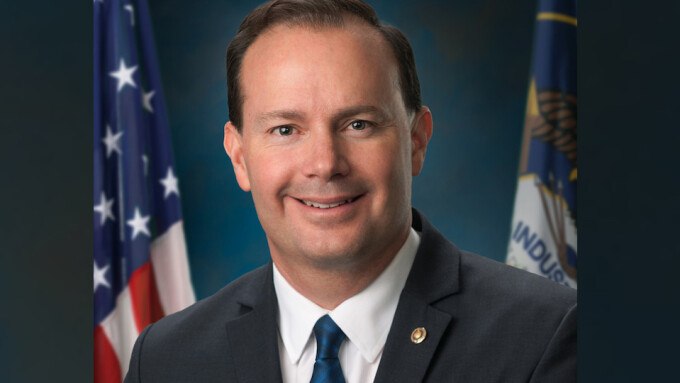WASHINGTON — Republican Sen. Mike Lee of Utah on Wednesday reintroduced a federal age verification bill that has twice previously failed to make it through Congress.
Lee’s somewhat strenuously titled Shielding Children's Retinas from Egregious Exposure on the Net (SCREEN) Act would mandate, on a national level, site-based age verification of users seeking to access adult content online. Its provisions are similar to the AV requirements in numerous state laws and bills that have been passed or are being promoted by religious conservative activists around the country.
Violations of the SCREEN Act’s AV requirements would be treated as a violation of the Federal Trade Commission Act’s prohibition against unfair or deceptive acts or practices. Violators would therefore be subject to civil penalties of up to $10,000 for each violation.
In its previous incarnations, the SCREEN Act failed to pass both the 117th and 118th Congress, both times dying in the Senate Commerce, Science, and Transportation Committee. With Republicans now in control of not only that committee but both chambers of Congress, Lee’s bill may encounter easier going this time around.
Contradictory Arguments
Lee is arguably the most vocal anti-porn crusader in Congress, having floated measures aimed at reviving obscenity prosecutions and outlawing all sex work.
Co-sponsoring the Senate bill are fellow Republican Sens. John Curtis, also of Utah, and Jim Banks of Indiana.
Meanwhile, Republican Rep. Mary Miller introduced a companion bill in the House, telling Congress, “We must take decisive action to protect our children from the scourge of pornography.”
Miller said in a statement, “I am committed to defending parental rights. I am proud to join Senator Mike Lee in introducing the SCREEN Act to the House, providing parents with more control over their children's online access and protecting our kids from exposure to pornography.”
The bill, however, would not provide parents with any form or amount of control. In fact, the actual language of the bill bemoans most parents’ failure to implement existing blocking and filtering solutions, and instead places responsibility for shielding minors from adult content in the hands of — ironically — the very adult websites and platforms that Lee has condemned as “bad actors” that should be put out of business, and that co-sponsor Banks accused of “attempting to poison the young minds of America.”
Vested Interests, Literal Hand-Waving
The SCREEN Act has garnered support from a wide range of religious and conservative groups — as well as from the Age Verification Provider’s Association (AVPA), whose members stand to profit from the passage of AV laws around the world.
Earlier this week, AVPA Executive Director Iain Corby met with the conservative Congressional Family Caucus, launched in 2023 by Miller. According to tech news site BiometricUpdate.com, that session included a presentation by France-based AVPA member company Needemand, demonstrating the use of gesture biometrics to estimate age.
On Wednesday, Miller appeared on the DirecTV program “Washington Watch,” and told the host, Family Research Council President Tony Perkins, “They’ve actually come out with technology where the screen would show a hand, and you have to put your hand up and do different movements, and that technology can identify the age of the child.”
Changing the Ground Rules
Like many current state-level AV bills, laws and legal challenges, the SCREEN Act’s prospects may depend heavily on how the Supreme Court rules in Free Speech Coalition et al. v. Paxton, the industry trade organization’s challenge to Texas’ AV law.
Anticipating a possible ruling requiring that the highest level of judicial review, “strict scrutiny,” must apply in cases where AV bills aim to protect minors but in the process burden adults’ access to protected speech, the SCREEN Act includes language declaring that site-based age verification is “the least restrictive means” by which Congress can achieve its compelling government interest in protecting minors from harmful content online.
That language essentially ignores the court’s 2004 decision in Ashcroft v. ACLU, which found that AV legislation did not utilize the least restrictive means possible to achieve its goals.
Congress does not have the power under the Constitution to overrule the Supreme Court, but Lee and his allies seem to be banking on the present court supporting the contention that in the two decades since Ashcroft was decided, technology has evolved sufficiently to change the ground rules set forth in that case.






